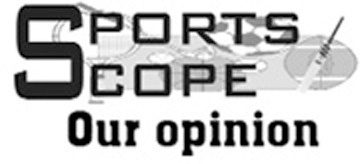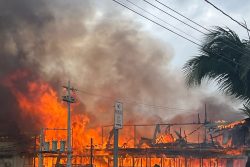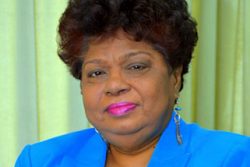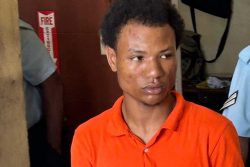 Guyana is about to be represented by five athletes in three disciplines at the 2024 Summer Olympics, officially branded as Paris 2024, which begins tomorrow and runs up to August 11 in France.
Guyana is about to be represented by five athletes in three disciplines at the 2024 Summer Olympics, officially branded as Paris 2024, which begins tomorrow and runs up to August 11 in France.
While those athletes, Chelsea Edghill (Table Tennis), Raekwon Noel (Swimming), Aleka Persaud (Swimming), Emmanuel Archibald (Athletics) and Aaliyah Abrams (Athletics) were granted spots at the Olympics through either wildcard entries or universality spots, it would be remiss of stakeholders in Guyana’s sports community not to question what are the Guyana Olympic Association’s (GOA) plans, ambitions and vision for the future, where the Olympic Games are concerned.
Before we get to the crux of the aforementioned concerns, congratulations must be extended to those athletes who have been granted a place at Paris 2024.
On the other hand, it must be noted that our athletes, while they have consistently given their best in their respective disciplines for Guyana, were handed lifelines to the Olympics rather than earning their respective spots.
To put things into perspective, Universality Places are extended to athletes from “underrepresented National Olympic Committees”. According to the International Olympic Committee (IOC), those spots are “designed to increase the diversity of participating nations across the sports programme of the Olympic Games”.
Furthermore, National Olympic Committees who participated with an average of eight athletes or less in individual sports at the Olympic Games Rio 2016 and Olympic Games Tokyo 2020 are considered eligible for Universality Places. Guyana is one such NOC.
The current President of GOA, Godfrey Munroe, only assumed office in March of 2023, replacing Kalam Juman Yassin who held that post for upwards of 20 years.
Munroe, a longstanding President of the Guyana Table Tennis Association (GTTA) would have had the task of furthering the country’s Olympic ambitions of adding to our medal count which stands at one, a Bronze Medal in boxing, courtesy of Michael Parris in Moscow, 1980.
With that in mind, Stabroek Sports reached out to Munroe, asking about the reason for Guyana not having any athletes who qualified for the Olympics directly through the respective qualification standards.
Additionally, Munroe was asked about any plans that were incorporated in the lead up to Paris 2024 and about what his plan is to aid our athletes in achieving qualification for the next Olympics in 2028 and beyond.
Those questions, sent to Munroe over a week ago, are yet to be answered or acknowledged.
While the first two questions might be a bit unfair considering that Munroe has occupied his post for little over a year, the third is very important.
With the large amount of oil revenue flowing into the country, the nation should be seeing vast development and improvement in relation to preparing athletes for the Olympics and international meets.
The 2024 budget saw $4.6 billion allocated for the advancement of sports in Guyana. According to the Ministry of Finance, “$1 billion to continue upgrading grounds throughout the country. $957 million to continue construction of multi-purpose sports halls in Regions 1, 3, 7, 8 and 9 as well as multi-purpose sports facilities in Regions 2 and 10”.
Those figures are vast improvements on previous budgets throughout Guyana’s history and are welcome, but will the money be spent wisely, is it being invested wisely?
Minister of Culture, Youth and Sport Charles Ramson Jr. has repeatedly pointed to his pet project of cleaning up and upgrading grounds throughout the country as a step towards ‘sports development’ in Guyana. Is it really? While facilities are vital to sports development, how are we going to help develop our athletes? How can we help them to improve their respective crafts? Is money being invested in edifying coaching personnel who are important cogs in helping to upgrade athletes? How is Guyana going to clinch their next Olympic medal 44 years down the road from our first and only?
These are the questions that the sports administrators need to start answering, and if they do not have those answers, they need to start working assiduously on finding and implementing solutions to those problems. To the GOA and its President, the ball is now in your court.









